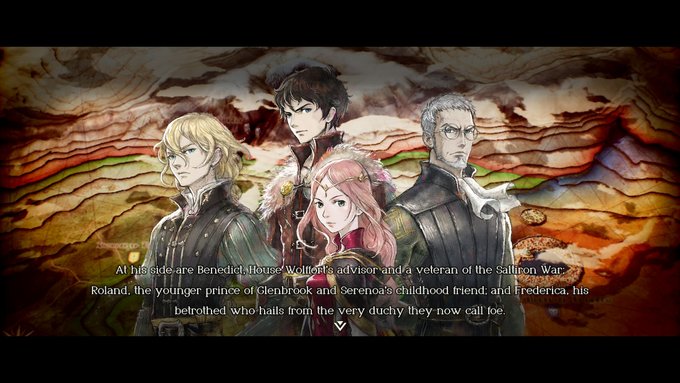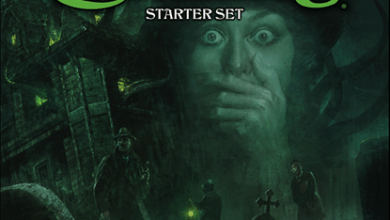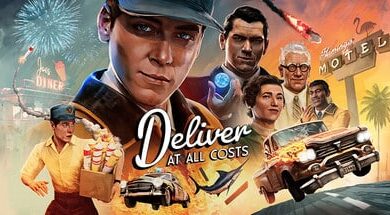What Makes You Put Down a Game? – A Reflection on Unfinished RPGs – Adventure Rules

Last month I celebrated a birthday and I was fortunate enough to receive a gift card from my grandfather as a present. It took me awhile to figure out what to do with the card. Since it was an Amazon card, I could only use it to purchase things available on Amazon, and most of the games I am interested in right now are indie or AA titles that are digital only on either PC or one of the consoles I own. Since you can’t buy a Steam card, eShop card, or PS Store card on Amazon, that meant I couldn’t use this money on any of the stuff I really wanted to get. But after sitting on it for a bit I finally found something that caught my attention: Unicorn Overlord was on sale.
Unicorn Overlord is a strategy game by Vanillaware, the studio behind 13 Sentinels: Aegis Rim. I really enjoyed my time with 13 Sentinels and so Unicorn Overlord had been on my radar, but when it originally released it was too close to other games I was more invested in so I didn’t jump on it right away. I was able to find it on sale and used my gift card to finally grab the game, along with a book I really wanted to check out. A few days later, my package arrived and my time to play Unicorn Overlord finally came.
This isn’t a review of Unicorn Overlord. I don’t plan to post a review because as it turns out, I have not finished the game and do not particularly plan to. This is not because Unicorn Overlord was bad. As far as my experience with the game goes, it was all perfectly fine. But something about it kept me from feeling motivated to pursue the game to its completion, and that experience got me thinking about what qualities in a game actually push me to play it to the end. Unicorn Overlord is the third title in a series of RPGs I have picked up in the last couple years that I thought were perfectly serviceable games, but which failed to compel me to roll credits. Today, I want to think about why that is, because I think it probably says more about the way I play games than it does about any of the games themselves.
Structurally, I’m going to go through each game and talk about my impressions and experience. Once I’ve gone over all three, I’ll reflect on the similarities between the experiences and what it might say about the reason I stick with a game – or don’t.

Triangle Strategy
I played Triangle Strategy in 2023, well after it had entered and exited the cultural zeitgeist. I’d been interested in it after trying the demo but was ultimately convinced to pick it up after seeing someone on social media talking about their positive experience with the game. The premise of Triangle Strategy is built on making decisions on the Scales of Conviction, an in-universe relic that also serves as a major game mechanic. Each time the party comes to a major decision, they vote together on the Scales of Conviction, and the choices you make lead you to different combat scenarios, story beats, and characters joining (or leaving) your party.
This choice system is arranged around a turn-based tactics game where each character in your army has a unique role to play. While two characters might have similar roles, like being healers or ranged damage dealers, the specific abilities they have available are distinct and so each character in the party has their own strengths and weaknesses to learn. Unit positioning to pull off special maneuvers like flanking is important to managing combat effectively, as well as using your abilities wisely to manage a limited pool of energy points so you can use your most powerful moves at the correct time.
I played a pretty good chunk of Triangle Strategy and was probably within a couple of chapters of beating the game when I dropped it. The thing I found frustrating about that game was the way in which the protagonist was sort of a nothing character who I really could not get invested in. Because the game allows you to make wildly different choices about what the character believes in, he can’t actually have any beliefs, because it has to be believable that he could make any of the two to three choices available to him at any given juncture. So when I would try to portray him as someone with convictions – like, for example, not being okay with slavery! – and he was wishy-washy about it because a different player could make a different choice and that has to be convincing too, I found myself not wanting to see the story through. I didn’t have faith that whatever awaited me at the end would be particularly well-executed.

Octopath Traveler 2
I tried the demo for the first Octopath Traveler and dropped it for personal reasons completely unrelated to anything about the game itself. But multiple game critics who I enjoy had really positive reviews of the second game, and earlier this year I was really looking for a solid RPG to sink my teeth into. So I decided to give Octopath 2 a shot. The premise of the Octopath Traveler games is that it is the story of eight different heroes, each on their own journey but coming together to support one another as they meet during their travels. I chose Throné the assassin as my protagonist and began my playthrough of the game.
Mechanically, Octopath Traveler 2 is a turn-based RPG. It has a sort of weakness and stagger system where each enemy has elemental or weapon weak points that, when exploited a certain number of times, cause them to drop their defenses and be vulnerable to higher levels of damage. Each character has their own unique class abilities to bring to bear, but you can also unlock new classes for everyone to have as their secondary classes to make them more versatile and create combos of both active and passive abilities. The thing I didn’t particularly care for with the class system was its slow rollout – it drives me nuts when a game takes forever to give you its most interesting mechanics.
Storywise, Octopath Traveler 2 was serviceable, though of course with eight different plotlines to jump between there were some characters I cared about way more than others. I found the way that nobody really exists in anyone else’s story to be jarring, as it created some moments of silliness in terms of tone or the stakes involved. I remember a particular moment where the dancer character was being threatened by a corrupt theater director, and it was supposed to be dangerous because the dancer is not particularly strong, but standing directly behind her was the assassin protagonist I had chosen! The fact that so much of the game just pretends that the other characters don’t exist really took me out of the experience, and the slow implementation of class changing had me bored enough that I decided to stop playing.

Unicorn Overlord
Now we come to the final and most recent game in this sad trilogy, Unicorn Overlord. I’ve already described how I’d been interested in Unicorn Overlord because of my experience with 13 Sentinels, and how I’d only passed on it originally due to the timing of its release. For those who don’t know much about the game, Unicorn Overlord is a “real time” tactics game where you can pause to give units orders and plan your method of attack. It tells the story of a continent overtaken by a corrupt emperor who can magically compel people to obey him, and the rightful prince who bears a ring which can remove that corruption.
Unicorn Overlord’s combat mechanics are centered around building units consisting of anywhere from 1-6 characters who each have a small selection of abilities suited to a specific combat role. When your unit meets an enemy unit, they autobattle, with the characters within the unit acting based on a series of conditional commands you’ve programmed in advance. Rearranging and refining these commands to make the most effective units possible for the given battle is the meat of this system. Characters also have field abilities they can activate to pull off maneuvers like teleporting, destroying barricades, or assisting in combat from a distance.
Unicorn Overlord’s story and characters – at least in the first fifteen or so hours, which is what I played – are nothing to write home about. It’s a far cry from the storytelling of 13 Sentinels, but I had heard this in reviews and had already prepared myself to not be invested in the story. Instead, I was ready to be compelled by the combat system, but I ultimately found that to be somewhat lacking as well. It wasn’t particularly challenging even on the second-highest difficulty, as there are a lot of tools to brute force the fights that make the actual strategy part of the whole thing somewhat irrelevant. And while you get new characters pretty frequently, established characters get new abilities rather slowly and upgrading the number of units you can have or the number of characters that can be in a unit is a slow process as well.

Reflection
None of these games were bad games. Each one had things I had complaints about, sure, but I have complaints about every game I play – no game is perfect, and most of the time the positives outshine the aspects of a game that don’t work for me. In particular, all of these games had core combat mechanics that I found enjoyable. Figuring out the best set of characters to bring to a match in Triangle Strategy was fun. So was learning enemy weaknesses and breaking them at just the right time in Octopath Traveler 2. Creating new units and arranging their tactics just right to make an unstoppable force in Unicorn Overlord was also fun. So why stop?
When I was younger, I thought of myself as someone who primarily played games for the story and characters. I never played games on a high difficulty and I mostly preferred RPGs, because those were the games that I thought had the best storytelling. As I’ve gotten older and expanded my horizons, I’ve begun to think of myself as more of a mechanics-first player. Sure, I like a good story, but I ultimately come to games for the tactile experience of play. And recent examples in my list of completed games like Bloodborne or Elden Ring make it clear that I can completely ignore a story I don’t care about as long as the gameplay is keeping me engaged.
Lately, I’ve been thinking about that framing. “Do I care more about story or do I care more about mechanics?” And I think that the honest answer is that it depends on each individual game and what I expect from it. Those expectations are what ultimately set me up for failure with all three of these games. I had high expectations of Triangle Strategy because I loved the demo and read solid reviews. I had high expectations of Octopath Traveler 2 because of the critics I followed who recommended it so highly. And I had high expectations of Unicorn Overlord because I loved 13 Sentinels so much. When each of these games turned out to be middling – positive experiences with some notable flaws – that disappointment and frustration turned into a desire to disengage from the games entirely. It’s not about whether I think story or mechanics are more important, but rather how my presumptions about the game match up to reality and how that affects my experience.
Maybe someday I’ll come back to one or more of these games and wrap them up. I’ve done it with other titles, after all, and theoretically I’ve got some life in me yet where I’ll have time to revisit some older experiences. But if that never happens, that’s okay too. There are so many games in the world – not to mention books to read, shows to enjoy, friends to hang out with – that there’s certainly no harm in dropping something that isn’t working for me anymore. I had my fun with these games and I know what makes them tick. So while it’s good to recognize that my expectations are important to manage in defining my experience with a new game, it’s also good to recognize that sometimes a game you didn’t like is just that, and let it go.



